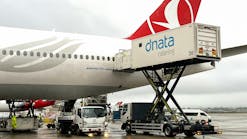Airlines Would Get Billions in Bailout, While Noncitizen Airport Workers Could Get None
Major airlines would receive billions of dollars in taxpayer-funded federal bailout money in the coronavirus stimulus package working its way through Congress, but many of the estimated 4,000 noncitizens who work at San Francisco International Airport might not get a dime.
The $2 trillion coronavirus relief legislation by Senate Republicans that was the starting point for negotiations includes $58 billion for passenger and cargo airlines and $1,200 in direct cash payments for American adults who earn less than $75,000.
But advocates are concerned that none of the money in that proposal was earmarked for noncitizens — not just undocumented immigrants, but those who are here legally but lack citizenship. They make up a large part of the workforce of the hospitality and transportation industries, sectors hit hard by the pandemic. San Francisco labor leaders say nearly one-third of its members are noncitizens, including large numbers of hotel and restaurant workers.
“This is really the most vulnerable population of the vulnerable population,” said Erin Quinn, attorney with the Immigrant Legal Resource Center in San Francisco.
“A global pandemic of this scale has really shown us how connected we all are,” Quinn said. “Our destinies, our health are all tied together. So we cannot afford to leave anyone out of the conversation right now.”
Roughly one-third of poorer Californians are noncitizens and the effect on them — and the overall economy — could be devastating if they lose their incomes, said Caroline Danielson, a senior policy fellow at the nonprofit Public Policy Institute of California who has studied the economic impacts of the pandemic.
“They make up a sizable share of our economy,” Danielson said.
Although the initial Senate GOP legislation would increase unemployment benefits, noncitizens with U.S. work permits wouldn’t be eligible for them, said Rudy Gonzalez, executive director of the San Francisco Labor Council. His member unions represent 100,000 people in the city, 20% of whom he expects to be out of work over the next few weeks as the pandemic takes hold and hotels and restaurants empty.
“The problems we face every day regarding homelessness and access to health care are going to become far worse than we expected if everyone doesn’t get some kind of help,” Gonzalez said.
Many other noncitizens are working in jobs that don’t have union representation.
Erika Garcia, 44, of Windsor, is an undocumented immigrant from Mexico who cleans houses in Sonoma County. With the state under a stay-at-home order, Garcia has been left without work and no way to pay the $1,600-a-month rent for the home where she lives with her husband and two teenage children.
“We can’t work,” she said. “I make up half of our household income and we pay rent. We’re a low-income family.”
Garcia added that she and others in the cleaning industry “are helping families with sanitation. In the end we’re the ones exposed to all of this, but are the ones who are forgotten.”
Often, noncitizens like Garcia look to nonprofits to help when government fails to provide assistance.
On Monday, Santa Clara County launched an $11 million relief program that will be funded by public money and donations from Silicon Valley companies, including $2 million from Cisco. To be eligible, a household must make less than 80% of the area’s median income and document loss related to the pandemic. The program is being administered by Sacred Heart Community Service.
Immigration status doesn’t matter for eligibility, according to Sacred Heart.
In late 2017, organizers in the North Bay established the UndocuFund to help undocumented immigrants who were victims of wildfires. The group has raised more than $7.5 million since then. Last week the organization shifted its resources to aid undocumented workers affected by the pandemic.
Organizers have received more than 990 calls and messages from immigrants looking for help after losing their jobs or having their hours cut, said UndocuFund coordinator Omar Medina.
“And they’re still coming in,” he said.
Medina estimated the group had about $220,000 in available funds as of Monday, almost certainly short of what will it will take to help everyone who needs it.
Meanwhile, Democrats in Washington pushed back on the initial Senate package. Whatever emerges from the Senate will still have to go through the House.
California Sen. Kamala Harris wants the Senate bill to include “direct cash payments to people who live and work in the U.S.,” said spokesman Chris Harris. “Coronavirus doesn’t discriminate based on immigration status, and neither should government’s response to this crisis.”
Fremont Democratic Rep. Ro Khanna supports legislation that would give every adult in America making under $130,000 annually at least $1,000 a month, “irrespective of immigration status.” Immigrants could immediately receive cash payments based on their previous tax returns if they filed with an individual tax identification number, he said.
Joe Garofoli is The San Francisco Chronicle’s senior political writer. Email: [email protected] Twitter: @joegarofoli. Tatiana Sanchez is a San Francisco Chronicle staff writer. Email: [email protected] Twitter: @TatianaYSanchez
———
©2020 the San Francisco Chronicle
Visit the San Francisco Chronicle at www.sfchronicle.com
Distributed by Tribune Content Agency, LLC.




